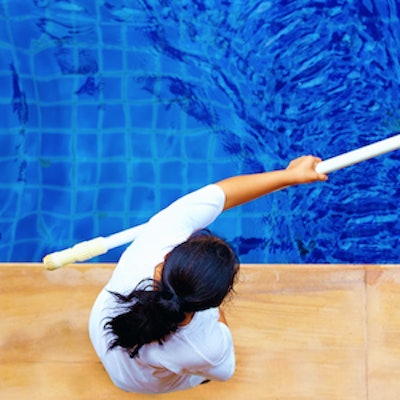
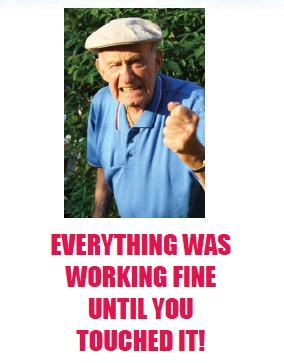
Swimming pool and spa owners often make assumptions about the pool and spa industry and its workers that actually contribute to their negative experiences of pool ownership. Obviously, those who are willing to take on the financial burden of pool ownership see the value and benefit in having their own pool. But despite the positives, the pool industry is unique in that consumers often associate pools with major problems, financial difficulty and general liability, and any person selling you something for your pool is viewed with skepticism. Much the way that used car salesmen carry the stigma of overcharging customers, being unscrupulous and willing to sell you a lemon, swimming pool industry workers work under a cloud of suspicion.
If you make your living in the pool and spa industry, it won't be long before you encounter an angry customer who wants to pin some blame on you for something you had literally nothing to do with. This is just a reality of the trade. The lack of oversight, regulation, training and trade certification results in an unstable market that lacks technical process. Unqualified and underqualified companies exist by the thousands, and pool owners are left to sort out the mess. While the jaded nature of pool owners may be well warranted, and well deserved, it does not necessarily make any of their assumptions true. Let's look at some of the most common misconceptions that pool owners have about pool industry workers.

#1: I'm Being Sold Chemicals I Don't Need
Pool owners are acutely aware that pool stores will probably sell them expensive chemicals they don't need. As a swimming pool industry expert I can assure you that there is no industry-wide scam in effect designed to talk pool owners out of their hard-earned money $20 at a time.
I know this might be hard to believe, but it is true. Hanlon's razor very much applies to this problem: Never attribute to malice that which is adequately explained by stupidity. If you think pool stores are force-feeding you things that you don't need in order to line their own pockets, then you are wrong.
It is, however, highly likely that you might be sold chemicals that you don't need simply because the person you are talking to is not actually knowledgeable about swimming pools and pool chemistry. If you doubt the validity of this statement I challenge you to go get your pool water tested in a pool store where the computers are currently down.
RELATED: The 12 Kinds of Customers Every Service Tech Meets
Water labs used to be managed by nerds, part-time chemists and people who were vastly experienced balancing water in swimming pools.
Today's water labs are run by computer programs with people doing little more than inputting values and handing over what the computer spits out. While the quality of water lab programs is very high, and they are very accurate, they are not a substitute for real-world water chemistry experts who can actually consider your specific situation.
For example, say you had seven days of rain in your area, and seven more are in the forecast. A computer program will not be able to understand these additional factors, how they can impact water chemistry and how to accommodate them.
In this situation, if the customer only follows the print-out instructions without additional input from an experienced water care professional, they will probably be back next week complaining about green water.
Another thing I have noticed is that pool owners tend to mix-and-match their pool chemistry advice … which I strongly discourage.
If you take a little bit of advice from the pool store, a little from your father, and a little from the fellow that lives across the street, you are probably going to have a hard time with your chemistry. First, there are pool owners by the thousands who have clear water only through dumb luck, so you should be highly skeptical of any non-professional water chemistry advice, best intentions aside.
If you take your advice from multiple sources, you are drastically increasing the chances that some of the advice that you are getting is bad. This is even true for pool stores. You should not go to multiple pool stores to have your water tested; instead you should find one person (or one store) that seems to be able to get you the results you want. Once you find this place, stick with them and avoid incorporating random additional advice from other stores, neighbors, friends, family or non-professionals.
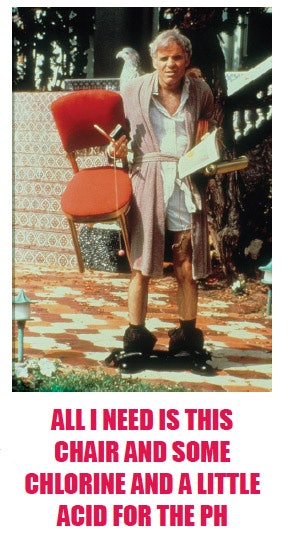
#2: Pool Guys Will Try To Rip Me Off
While I am certain there are all sorts of unscrupulous people in the world, some of whom must surely work in the pool industry, the vast majority of pool guys are NOT trying to rip off homeowners. As stated above, it is far more likely that the pool guy in question does not have the knowledge and/or experience to deal with water chemistry issues problems as opposed to an attempt to rip off customers.
If a homeowner asks 10 different pool guys a technical question, they're likely to receive 10 different answers. It is not that these 10 pool guys are trying to rip anyone off, it's just that they have 10 different skill sets and 10 different levels of experience. More often than not, it's simply a lack of technical understanding.
Over the years, I've learned pool owners are worried they'll be ripped off for one big reason: They don't understand just how many kinds of pros there are in the industry.
The pool and spa industry is very much divided into groups, and how these groups overlap is very significant. First, there are three main types of swimming pools: concrete, vinyl liner and fiberglass. Many companies tend to focus on one of those three, some install two and very, very few do all three.
Someone who has been installing concrete pools for 40 years will obviously have a ton of experience and knowledge relating to that craft. Does this mean they know anything about vinyl liner pools? Not really. I mean, sure, they will have a ton of relatable knowledge and a lot of overlap between the two kinds of pool, but this person is not a vinyl pool specialist.
The problem is, pool owners think all pool guys are the same, not realizing they need to look for someone who specializes in what they have or want to do.
Making it even more confusing is how this classification continues in all three markets. For example, someone who installs pools is probably not interested in vacuuming your pool every week.
Sure, some builders offer service and some companies are three-legged stools. But homeowners need to learn that every pool company has strengths and weaknesses, and that they should not be afraid to inquire about the "bread and butter" service of the company they're interested in.
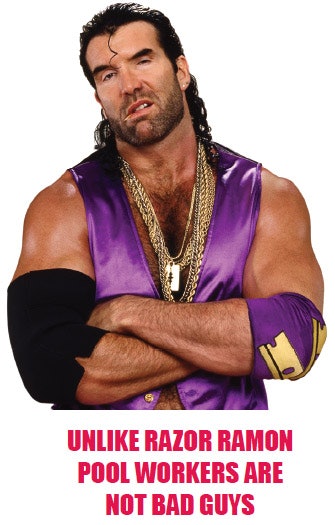
What I Wish I Could Say: "Getting your head around these divisions within the industry will go a long way towards finding the right person for your specific pool situation. If you have a problem with your water quality or some staining in your pool, asking a pool builder may not be as effective as asking a weekly pool maintenance company that vacuums and balances 1,000 pools per week.
The same goes for asking about pool pumps: If you ask a pool builder about pool pump service, they will likely just tell you to replace it with a new one that they can sell you, because that is what they do. A service company, on the other hand, which may deal with hundreds of pump service calls per week, might know of a common fix for your pump that will get you back up and running for far less money.
It's not that the builder was trying to rip you off. That company is simply not set up for pool pump service, so the most efficient way to solve the problem to them is just replace it. A service company, on the other hand, might have an experienced service technician and a fully stocked truck that allows them to service and repair your pump in a single visit. It is simply because the service company specializes in pump service that they are able to offer a better (and cheaper) option."
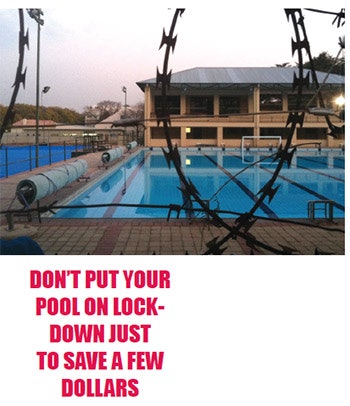
#3: As A Thrifty Pool Owner, I Should Spend As Little As Possible On My Pool
Since the financial aspect of pool ownership is one of, if not the biggest concern for pool owners, it's understandable that pool owners try to get the most life out of their pool for the minimum amount of money. There is, however, a fine line between being frugal and cost effective and actually costing yourself a pile of extra money that you didn't need to spend. One of the biggest fallacies in the pool industry is the "trying to get one more season" approach of pool ownership.
In an attempt to save money on pool repairs and renovations, pool owners will put off needed repairs for one or more pool seasons. While the logic makes sense to save up for repairs that you can't afford, the pool unfortunately doesn't care about your plans. Picture a pool like a car and you will probably understand what I mean. When a car has something that breaks you tend to fix it right away or stop driving it until you can have it repaired. While I am sure many readers are saying right now they drive their car despite a great many broken things, I'm not talking about a glove box that falls open when you go over a bump. I'm talking about flat tires. If your car had four flat tires would you keep driving it to work every day? Most likely not.
When a pool has a problem with the structure, the interior surface, the plumbing system or your filtration equipment, it's the same as having four flat tires on your car. To the untrained eye, the pool might still look OK, leading the homeowner to think they can continue to run it despite leaks or a failing interior surface.
RELATED: 6 Things a Pool Guy Hates to Hear
What I Wish I Could Say: "What you, Mr. Homeowner, do not fully appreciate is that you are buying yourself more than just time — you are buying yourself more expensive repairs than you needed to begin with.
For example, take a look at your vinyl liner. It should be replaced because it's seven years old and showing signs of age, chemical damage and deterioration. If you replace the liner at this stage you will likely get another seven years for around $3,000 (just to use as a working number).
Now, what many pool owners prefer to do is to put off that liner replacement that was needed in year seven until year 10, when the liner is now well past its service life. What these homeowners don't realize is that the shrinking vinyl liner was putting more and more stress on the coping retainer every year. If the coping was made from PVC, as many are, it would have started to stretch, bend and eventually crack. Once this happens you will need new coping installed before you can hang a new liner.
Now, instead of $3,000, you are looking at $4,500 since you need coping now, too. Hopefully you do not have deck-integrated coping that needs to be replaced, like bull-nose coping that has the concrete deck poured right into it, because if you do then you need to remove and replace the entire pool deck as well. Now that $3,000 at year seven has turned into $10,000+ in year 10. This does not even factor in that for three extra years you had an old (and probably leaking) liner in your pool. All of the water that was leaking from your liner caused additional rusting and pitting on the walls of your pool, which now need repair before you can hang a new liner.
Also, water tracking behind the liner can cause damage to sand- and mortar-based pool floors. If the damage is serious enough, you might remove the old liner only to discover that you also need a new smooth bottom on the pool, which is $3,000 all on its own.
So for the extra three years that you tried to get out of your failed liner, you need a new liner, coping, deck, wall repairs and a new floor. If you had changed the liner when it was time then, you would have been out $3,000 and been set for the better part of another decade. Now, you need $20,000 of pool repairs, which you can't afford, so you start to look into filling in your pool, only to discover how expensive it is to fill in your pool. It's much more than you thought, and much more than it would have cost you just to replace your liner when the time was right.
So overall, if you are one of "those people" who tend to procrastinate with fixing things, and you let your pool repairs slide even for a short while, then your pool is most likely going to teach you some expensive lessons in the future."
Steve Goodale is a renowned pool and spa humorist and a second-generation swimming pool expert who lives in Ontario, Canada. You can learn more about Steve, as well as swimming pool construction, maintenance and repair (and have a few laughs) at his website: SwimmingPoolSteve.com.












































